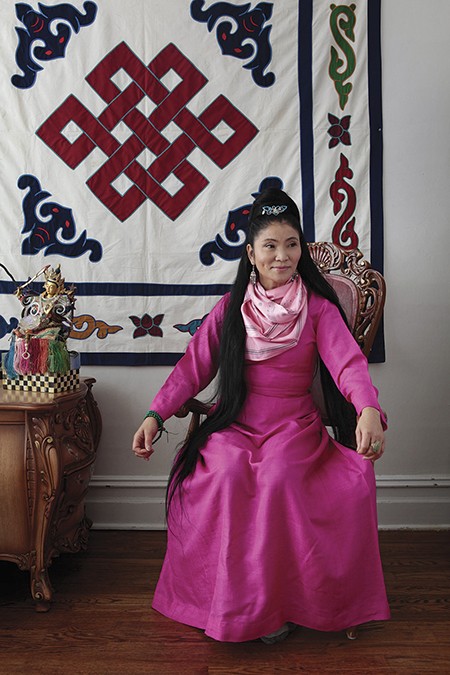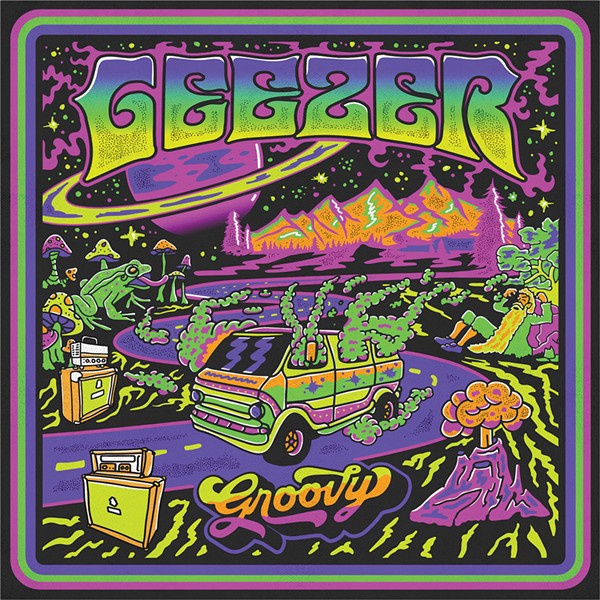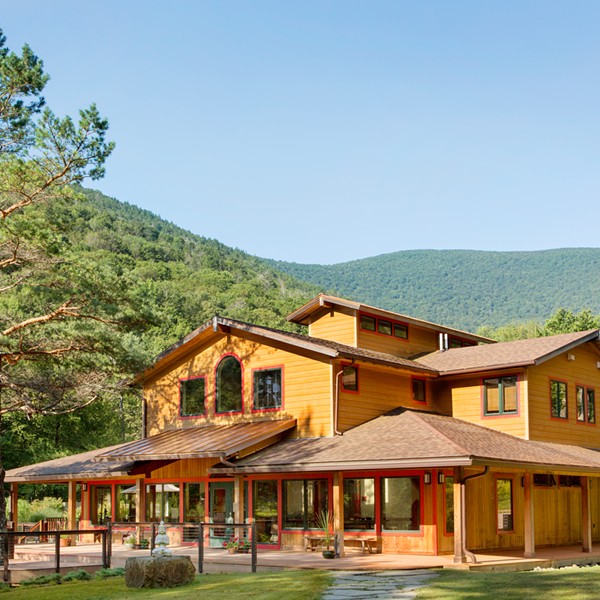You are beautiful, I am beautiful," goes the chant.
The chanters are residents of Chiz's Heart Street, a Kingston shelter for homeless and mentally ill people, many of whom suffer from schizophrenia. Several of the men have on brightly colored wigs and multi-hued polyester house dresses; one of the women wears a red necktie and a jaunty Homburg. The costumes and chanting are part of a musical play, and the participants and the audience are clearly having fun. Leading the chants and acting alongside the performers, just as she does nearly every Wednesday afternoon, is the Tibetan singer Yungchen Lhamo. Her magenta, traditional silk wrap dress and her hair, which falls well below her waist, make her a visual beacon that eclipses even the garish getups of the actors. She holds the hands of the childlike players, smiling and looking deep into their eyes as she directs them. They smile and look back. And then she starts to sing.
Starting out softly, her soprano voice rises and glides like an Asian bansuri flute or spike fiddle, filling the otherwise silent room with a gentle, arcing, lullaby-like sound. Everything is focused, all is calm, and the overall mood of reassuring love and welcoming warmth in the space is so devastatingly humbling, that, quite honestly, your music editor struggles to keep his tears in check. Theoretically, it's the realm outside this facility that's the bastion of sanity, the one within that's unsound. But as of this visit, especially in light of current world events, things feel much the reverse.
"Yungchen wandered in about a year ago and asked if she could come and sing," recalls Mary "Chiz" Chisolm, the center's executive director. "I had no idea who she was or what kind of singing she did, but I said sure. And what she's done has been amazing. The fact that these people can now focus on something for any length of time is a miracle. Most of them wouldn't even speak before."
"It makes us feel more like family and gives us a sense of community," says Linda Jessat, a resident since mid-2014. "We need those things, we're no different from anyone."
"We love the singing," says Wilbur Daye, who arrived in December 2012. "We love everybody."
Lhamo is a Grammy-nominated paragon of the world music stage and a symbolic ambassador for the culture and plight of the Chinese-dominated Tibetan people. In addition to singing for the Dali Lama and meeting with the Pope, she has performed at prestigious venues and events across the globe with Bono, Natalie Merchant, Peter Gabriel, Philip Glass, Patti Smith, Michael Stipe, Sheryl Crow, Smashing Pumpkins' Billy Corgan, and others. She was born in 1966 to a Buddhist monk and nun in Lhasa, a city known for its temples and palaces. "One of my earliest memories is the sound of prayer," says the vocalist, whose name, which means "Goddess of Song," was given to her by a local Lama shortly after her birth. Her grandmother taught her Buddhist devotional singing, but despite Lhamo's presumed birthright she was resistant early on to her calling. "I prayed that I would quickly become a man and grow up, because I thought 'I am small, but men are big and strong and better at helping people,'" she says. "I told my parents and my grandmother this and they said, 'Oh, no! Yes, you should pray, but not for these things.' They told me, 'You have a gift [for singing] and if you truly want to help others, you [should] sing.'"
In 1989 Lhamo fled the violent clampdown that followed that year's Tibetan unrest, carrying her baby son on her back as she hiked for two months through the Himalayas to freedom in Dharamsala, India. She spent four years there singing for other refugees and learning more Tibetan music, and received the blessing of the Dali Lama, who encouraged her to further use her art to help others. She gained passage to Australia in 1993 and began singing for the meditations at a Buddhist center there, which resulted in the recording of Tibetan Prayer (Independent). The stark disc of ancient chants won the 1995 Australian Recording Industry Award (that country's equivalent of a Grammy) for best world music album, which led it to the ears of ethnic music enthusiast Peter Gabriel. The ex-Genesis front man signed Lhamo to his Real World label to re-record the largely acapella Tibetan Prayer as 1996's Tibet, Tibet. Slots on Lilith Fair and Gabriel's WOMAD tours followed, as well as Lhamo's 1997 US debut at Carnegie Hall and an appearance at the Beastie Boys-curated Free Tibet Festival. She released her second album for Real World, Coming Home, in 1989 and that year, Lhamo also appeared on the soundtrack to Seven Years in Tibet and Natalie Merchant's Ophelia (Elektra).
"Yungchen sings like an unearthly creature," Merchant says. "Her voice has the power to stop time and makes everything else in the world fall away. Her voice transports you."
The singer and her son emigrated to New York in late 2000. "America seemed like a monument or a flag to look up at," Lhamo says. As they did for all of us, the September 11th attacks shook her deeply. "That day, no matter how powerful you were, the sight of people falling from those buildings made everyone numb. I remember that feeling of helplessness. I think we all felt that. Then, of course, we all cried, no matter what country you were from. Now I travel the world, and when I see a city that looks like New York, it reminds me of that day." She was moved by the horrific events to compose the keening lament "9/11" for 2006's Ama (Real World), a New Age-tinted album that features the guest vocals of Annie Lennox. "This song begins and ends with chants reminiscent of a puja [Buddhist expression of honor, worship, and devotional attention] for the people who died, with prayers to ease their passage to another world," she explains. Lhamo continued to tour widely for the next few years, not releasing another album until 2013's minimalist Tayatha (Cantaloupe Music), a collaboration with Russian pianist Anton Batagov.
Lhamo's friend Merchant, a long-time Hudson Valley resident, encouraged her to move to Kingston. "She would always say, 'Yungchen, you should come up'," says Lhamo. "Natalie is a very special artist, and I'm very proud and honored that she took me in her arm[s]." After settling upstate in early 2014, she started the Yungchen Lhamo Charitable Foundation to assist Tibetans with direct relief supplies (food, clothing, shoes, artificial limbs, and medicine). In 2011, the organization launched an ongoing campaign to raise the desperately needed funds to construct an aqueduct in the Tibetan village of Nugchu (pop. 600). "The people have no place to get water there," Lhamo says. "They must walk for one hour in each direction into the mountains to get snow or ice to melt into water for their families and their animals."
Lhamo's association with Chiz's Heart Street came about one winter when she encountered a mentally ill homeless man in Uptown Kingston. "I saw he had no shoes and his feet were very bloody," she says. "I tried to talk to him and he was very angry and saying all these bad things to me—'Get away from me! I hate Asians! I will kill you!'—all of these kinds of things. But I went to him and I hugged him. I said, 'You can kill me. But only if you promise not to kill anyone else.'" The man calmed down and Lhamo walked him to her nearby apartment. There, she fed him hot tea and soup and washed his feet. "He said to me, 'No one ever did these things for me before. My mama, she did not want me.' Then he said, 'Can I call you Mama?' I told him yes, 'You can call me Mama. We are all mama for each other. We are all one.'" Lhamo offered to let the man stay overnight, but he declined. So she brought him a few blocks away to the Washington Street shelter.
"[Lhamo] is the most kind, selfless, and principled woman I have ever known," says Merchant. "She has endured great hardships in her life but holds no bitterness toward anyone and maintains a childlike innocence and wonder."
The exiled Tibetan performed on composer Johnathan Elias's 2011 album Prayer Cycle 2: Path to Zero (Across the Universe Records) and recorded some yet-to-be-released material with him and separately with producer Peter Asher (formerly of the British Invasion duo Peter and Gordon). On her own, she's planning a new album of healing Medicine Buddha mantras. "In Buddhism we know some sounds can heal the body," says Lhamo. "Yes, we must sometimes use Western medicine, still. But sometimes we think, 'I will just take this pill,' when maybe we don't need to take a pill. With these sounds, we can make ourselves and others feel better."
It's a long way from the Himalayas to the Catskills, and Lhamo hasn't seen Tibet in nearly 30 years. Does she ever get homesick? "Wherever I sit, the minute that I arrive anywhere, I always treat that place as my home," she says. "But that is just a place. The real home is inside of us."
















